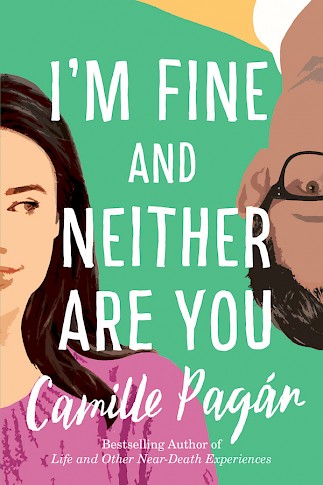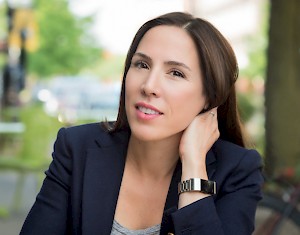
Psst!! HAVE YOU ENTERED THE CONTEST TO WIN A COPY OF THIS NOVEL, ALONG WITH MY NEW BOOK, WOULD I LIE TO YOU? Check out my Instagram post with the official contest rules. Contest ends January 31, 2020, at 5 p.m. EST
A few chapters into Camille Pagan’s new novel, I’m Fine and Neither Are You, I realized it was a story about honesty. In fact, the main character, Penelope, basically goes on an honesty journey—just like I did in writing my forthcoming book about honesty! This caught my attention, to be sure. In fact, I knew that I wanted to talk to Camille about it.
As luck would have it, I know Camille. Like me, she’s a freelance writer, and we’re colleagues in that way that freelancers who generally support each other are. I first met her way back in either 2006 or 2007 at the ASJA writer’s conference. I remember sitting on a couch having a conversation with her about . . . I don’t know, actually. Writing probably. Mostly, I remember that she had the most amazing wrap dress on! (Yes, it is true that half of going to a conference is just figuring out what to wear.)
And now, she is going to be the keynote speaker at this year’s ASJA conference on May 6th! Not only am I honored that she sat down with me to do this Q&A about how honesty plays a role in her novel, I’m also super excited to hear her speak in a few weeks!
(Oh, and by the way, this is Camille’s fifth novel, and it was featured on Amazon when it came out. Actually, she is constantly getting featured on Amazon, and her novels consistently get terrific reviews.)
With that, here is our conversation about honesty . . .
Judi: When you started sketching out this novel, was the theme of honesty there from the start?
Camille: This novel started with the idea of a couple who gives each other a list of things they want the other person to change—which is an endeavor that centers entirely around honesty (at least in theory). So yes, I began with that theme in mind. As I began to write, and then edit the novel, it struck me that the protagonist, Penelope, faced the question of whether to be honest—and if so, how much?—at every turn, but just didn’t realize it until she committed to honesty in her marriage. For example, Penelope doesn’t find her job fulfilling, but she needs the paycheck, so she has to decide how honest to be in order to keep her job but be true to herself.
Judi: I feel like the vast majority of people assume they are honest, and don’t realize the half-truths they tell or the ways they are subtly dishonest. Do you think your characters thought they were honest in the beginning?
Camille: I think about this every time I hear someone say “I’m the worst liar” (which I’ve said more than a few times myself!). I don’t know the data, but I’d be willing to bet most people are pretty honest in their day-to-day lives, and save most of their lies for little things that need smoothing over. Yet most of us, myself included, have also told some pretty big whoppers, sometimes without hesitation—not because we are trying to be deceitful, but rather because lying actually seemed like the right thing to do. Several of my characters approached lying as an act of morality. The question is: can lying be moral? Even after writing a whole book about this, I don’t know the answer.
Judi: I wrote a whole book about this too, and I don’t have a great answer either! So, like me, you’re married with two young children, and you work a lot. That alone is difficult! Focusing on honesty adds a level of difficulty to all of that. But that’s when Penelope—also married with two young children and working a lot—does, because the alternative suddenly seems more frightening. Is there any of your own honesty struggles in Penelope?
Camille: My marriage is really different from Penelope and Sanjay’s—for better or worse, my husband and I have always been pretty darn honest with each other. That's difficult in its own way, because once you admit something’s an issue for you, then you kind of have to address it, you know? Honesty often takes more work than just smoothing an issue over with a little white lie (or even a whopper).
That said, writing this book made me realize I was glossing over the truth in some areas of my life. For example, I was doing some well-paying work I really didn’t love—but I was hesitant to admit that for fear of … well, I’m not even sure what I was afraid of. Of being ungrateful for not wanting to do something that helped pay my mortgage? Of knowing other people were struggling to find work? I’m not sure, but writing this book did give me the courage to make a change by ditching that well-paying client.
 Judi: It’s funny you say that, because writing my honesty book gave me the courage to ditch a well-paying client, too! Or I should say, it pushed a misalignment that I had been trying to ignore to the front and center. But like you said, there is fear, because it feels like something is at stake. I often think about honesty in relation to stakes (what’s at stake in being honest; what’s at stake in NOT being honest). How did you think about the stakes of honesty/dishonesty in shaping these characters?
Judi: It’s funny you say that, because writing my honesty book gave me the courage to ditch a well-paying client, too! Or I should say, it pushed a misalignment that I had been trying to ignore to the front and center. But like you said, there is fear, because it feels like something is at stake. I often think about honesty in relation to stakes (what’s at stake in being honest; what’s at stake in NOT being honest). How did you think about the stakes of honesty/dishonesty in shaping these characters?
Camille: In this case, a marriage is at stake—which is pretty extreme! And yet both the protagonist and her husband come to realize that as high as the stakes of honesty are, the stakes of continuing to lie may actually be higher.
Judi: Exactly. Penelope first challenges her husband, Sanjay, to be more honest about their relationship, and then he winds up challenging her to be more honest and direct with the people in her life. But they both seem to move in fits and starts, each back-tracking at times when the stakes start to get scary. For example, when Penelope is honest with the rude neighbor, she says, “Saying my piece may have offered instant gratification, but the aftermath was exhausting.” Did you spend a lot of time thinking about the nature of honesty and its consequences?
Camille: As much as it would have been easy to write a more straight-forward narrative, I think that honesty—like so many other things—is a process, not a destination, and it’s not as simple as deciding, “Well, I’m just going to be completely honest from here on out.” It’s not so much that I spent a lot of time thinking about honesty itself when I was writing this novel—but rather that I put a lot of thought into writing these characters as real, flawed people who zig-zagged their way to a better relationship, which is how I think it usually happens in real life.
Judi: I also want to ask about the role of secrets, because there are so many ways to think about secrecy. There is a difference between holding on to information that is private, and hiding secrets that are potentially destructive for us and the people around us. This feels like a theme of the book—the idea of people (especially women) hiding their struggles. What do you think that’s about?
Camille: Well, I do think society expects women to behave a certain way—we’re supposed to be #blessed and #grateful at all times, if you know what I mean. And it’s easy to confuse that expectation with what’s actually best in a situation—which is sometimes admitting, “Hey, I’m really struggling over here.”
As you know, this book discusses addiction, and I think there’s still so much stigma surrounding that—many people believe addiction is a willpower issue, when research shows us that it's a disease. So it’s no surprise that so many women don’t get the help they need for substance abuse issues.
Judi: I picked up the book without having any idea that it addressed addiction, or of what event was going to start the story in motion, and I definitely found it powerful—and timely. So, how does honesty ultimately help your characters? Is there a lesson readers could take from that?
Camille: It did help them, because being more honest with each other helped them be more honest with themselves—and that’s what really led to their personal breakthroughs.
Judi: If it can produce breakthroughs (which I believe it can!), why do you think honesty is still so hard for people?
Camille: Well, because it’s more work. If you ask me how you look in a pair of pants that I think are awful, and I tell you the truth (nicely, even!) then I may have to deal with your hurt feelings. If I’d just lied, then we’d move right along instead of having a conversation or you having to change. And that’s just an outfit! When you start addressing deeper issues in a long-term relationship—such as communication, desire, and even what you want out of life now, as opposed to what you used to want—that can be tough. We already all have so much on our plates that it’s no surprise that sometimes you want to plaster on a smile and just say that everything’s fine.
Judi: Hence the book title! One last question: As someone whose husband has been a stay-at-home-day for a long time, I appreciated that you made Sanjay a stay-at-home dad (though my husband is pretty different from Sanjay). We don’t get to see that many stay-at-home dads who aren’t caricatures. Why do you think that is?
Camille: My husband works out of the home, but he did stay home most of the year my son was born, freelancing a little on the side. I was shocked by some of the stupid things people said to us during that time—it made me realize that as evolved as we are (in the U.S. alone), we’re really still stuck on certain gender norms, and these norms are often damaging and disrespectful. I’m glad you didn’t think Sanjay was a caricature! I didn’t want to paint him as a total slouch or too perfect, but rather someone (like his spouse) who had gotten stuck in a rut without intending to.
Judi: I hear that! Stay-at-home-dads are neither awesome because of the mere fact that they are taking on a caregiver role, nor are they bums who can’t support their family. They are flawed and complex and resourceful and face many challenges—just as stay-at-home-moms do. But their experience gets flattened in so many portrayals I see in popular culture. Anyway, thanks so much for talking with me, Camille!
Camille: Happy to do it! Thanks for thinking of me, and for reading my novel.
On that note—this is Judi writing again—if you want to read I’m Fine and Neither Are You, check it out here.
Stay tuned for a big announcement from me very soon about my own book, due out December 31 of this year.

